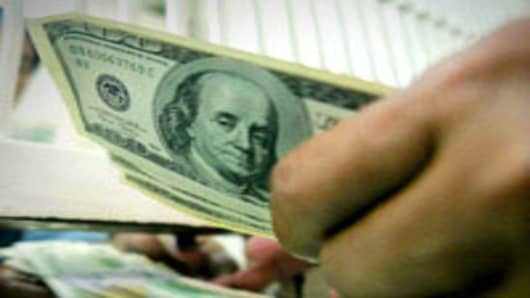Long seen as a place of safety in times of turmoil, the dollar may be losing its haven appeal.
Soaring oil prices, driven by upheaval in the Middle East, falling equities and elevated volatility have all made investors uneasy.
A flight to the dollar usually accompanies increased risk aversion. This time, though, while the traditional havens of the Swiss franc and the yen have benefited, the US currency has suffered.
“It seems the dollar’s haven status has vanished,” says Steve Barrow at Standard Bank. “And, even for long-term dollar bears like ourselves, this is a worry.”
The main reason for the dollar’s underperformance, say analysts, is concern about the effect of rising oil prices.
The dollar has dropped to a record low against the Swiss franc and fallen 2 percent to Y81.82 against the yen in the past two weeks, just shy of the all-time low of Y79.7 it hit against the Japanese currency in 1995.
It has also lost ground against the euro and sterling.
The fear is that higher oil priceswill lead to a transfer of funds from oil-importing countries to the sovereign wealth funds of oil-exporting nations.
Mansoor Mohi-uddin, global head of FX strategy at UBS, says such funds tend to keep a low proportion of their assets in US markets compared with traditional central bank reserve managers.
“Thus the greenback is also being undermined by fears that higher oil prices will lead to increased sovereign wealth fund dollar diversification activity,” he says.
Kit Juckes, head of FX research at Société Générale, argues that the dollar’s under-performance reflects what he calls a “risk-averse but yield sensitive” environment.
While the yen and Swiss franc have been driven higher by haven appeal, the euro and the pound have at the same time been supported by increasingexpectations that the European Central Bank and the Bank of England will deliver interest rate rises before the US Federal Reserve.
And John Hardy, FX strategist at Saxo Bank, says the dollar is also suffering because of the Fed’s lack of credibility on inflation, given the risks of a continued rise in oil prices.
“The market assesses that the Fed will ignore inflation and launch a third round of quantitative easing, as it prefers to concentrate on its growth mandate, while the rest of the world’s inflation-focused central banks hike rates to deal with the inflation threat,” says Mr Hardy.
But he says the market remains confused, with the rally in government bond prices triggered by haven demand hardly consistent with fears over inflation and very supportive of the Swiss franc and the yen, the lowest-yielding currencies.
“Commodity currencies are somewhere in the middle, not sure whether they should celebrate higher commodity prices or fret about the risk-off environment. Something is going to change dramatically in the coming couple of weeks as a more logical set of themes emerges,” he says.
Other factors are denting the dollar’s appeal.
Some analysts cite the risk of Washington becoming involved in military action in the Middle East as weighing on the US currency.
Yet, Mr Mohi-uddin says, while there are risks of further near-term losses for the dollar, he would be wary of chasing it lower from current levels.
After oil prices peaked at near $150 a barrel in the summer of 2008, for example, the dollar rebounded sharply.
True, the currency’s gain was triggered in large part by the collapse of Lehman Brothers in September 2008, but it had already began its upward trajectory as equity markets started to fall from the middle of the year.
Mr Mohi-uddin says the events of three years ago serve as a warning against becoming too bearish on the dollar, especially given equities have only weakened slightly on the back of the recent tensions in the Middle East.
The S&P 500 has fallen 1.2 percent from its intraday high of the year of 1,344.02, sliding as much as 2.8 percent last week from that high before rebounding over the past two trading days.
Mr Mohi-uddin argues that if equity investors start to worry that higher oil prices will lead to sharply lower growth, the dollar is likely to rebound as stock markets decline, investors reduce their expectations of interest rate rises in Europe, and US portfolio managers repatriate funds from abroad.
“Foreign exchange investors need to watch whether equity markets will continue to hold up or not in the face of rising oil prices,” he says.
Adam Cole, global head of FX strategy at RBC Capital Markets, agrees, saying the dollar’s failure to rally in recent weeks does not reflect a shift in its status as a haven so much as a change in how investor risk appetite affects the forex market.
Now, he says, risk is playing second fiddle to the varying expectations for interest rate moves by central banks.
Were fears of Middle East instabilityto spread from oil to other markets, then those rate expectations could converge on each other, making risk appetite the dominant forex driver again.
The corollary to this, says Mr Cole, assuming the US currency retained its haven status, would be a stronger dollar.


